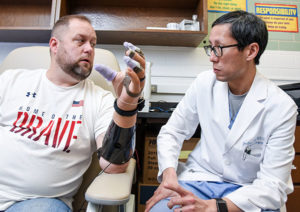MOUNT PLEASANT—In 2005, Shawn Findley was working through a day like any other day at a local fabrication shop. That stopped as quickly as the punch press machine that mangled his hand.
Findley was rushed to the hospital, where he learned his life had changed forever. He was going to lose his hand. In the hospital bed, he had time to think. He felt depression creeping in.
‘Studying the book of Job’
“I was in the hospital for nine days,” he said. “You’re just laying there getting poked and prodded. It was a lot of me reading my Bible, studying the book of Job.”
Findley endured 12 surgeries in the next four years in attempts to ease the pain in his left arm. He took medicine three to five times daily to the point that he felt like it affected him. He feared he was on the edge of becoming addicted.
“The more it hurt, the more pain medicine I had to take,” he said. “The more pain medicine I took, the less I was myself.”
He took the only action he knew would end the pain—one final surgery. He chose to amputate his arm at the middle of his forearm.
Difficult journey begins
The immediate loss of his hand followed by years of pain was a difficult journey, Findley admits. It was emotionally trying and faith testing. In some ways, he’s still adjusting when he encounters a new situation to navigate with his prosthetic hand.
“It’ll change you,” said Findley, associate pastor and youth minister of Nevill’s Chapel Missionary Baptist Church in Mount Pleasant. “It’ll change you in a heartbeat. Going through that process and learning to live with change, heavily relying on faith, it changed the way I view people.”
Buoyed by his faith, Findley has pushed through. Energy radiates from him, encouraging those around him. He even sees ways the amputation is helpful.
“I have embraced the amputation to a point that I use it as a teaching tool,” he said. “Not every preacher has a built-in teaching tool.”
A teaching tool
Findley has used his amputation to teach young children, “It’s OK to be different.” He’s used it to help teens accept change—even unwanted change. For adults, Findley uses his story to help people know they can overcome obstacles in life and thrive.
“Whatever lot you’re dealt, it can be a detriment or you can use it to glorify God,” he said. “I try to do that every day.”

Findley’s ministry has reached beyond Mount Pleasant. He’s involved in a cutting-edge research project at UT Southwestern Medical Center in Dallas, where doctors are attempting to improve communication between a person’s nerves and prosthetic devices so the prosthesis moves and reacts more naturally.
Hope for amputees
The effort could revolutionize the lives of amputees. While the hand can perform up to 22 different functions simultaneously, the most sophisticated commercially available robotic hands can only control three functions—one at a time.
Recently, two technologically advanced research-grade robotic hands have emerged, both of which have 20 to 30 distinct functions. But the newest devices don’t have practical applications yet because researchers have not mastered natural communication between a person and the devices. The UT Southwestern project is attempting to resolve those issues to the degree patients can type on a keyboard or play a musical instrument. Recently, Findley relearned how much pressure is required to pick up small weights.
“Feeling your hand is absolutely the purpose here,” said Dr. Jonathan Cheng, who is leading the study. “For all of my other patients, being able to feel with their hand is mandatory. It should be no different for patients using robotic hands.”
The research is exciting, Findley said. The amputation journey is a difficult one. He hopes this research helps people around the world.
Change perspective
The accident and amputation “changed my view on a lot of things,” he said.
“If I can get involved in some of these things and improve the product, increase the information out there, I’m all for it,” Findley said.
“I have a 19-year-old son in the Marines. You hope they all stay out of harm’s way, but you want to have done what you could. If something did happen, well, you know you might have helped in some way. You’ve got to have someone willing to do this, and I’m here (for the study) for as long as they want me.”
Findley’s accident is part of him, as is the road that led to the amputation of his hand. He prays he can use both to reach others for Christ.
“Be willing to be used,” he said. “The great accomplishments in life required somebody to try. Limitations don’t have to define you. The limitations are meaningless when it comes to being used by God.”















We seek to connect God’s story and God’s people around the world. To learn more about God’s story, click here.
Send comments and feedback to Eric Black, our editor. For comments to be published, please specify “letter to the editor.” Maximum length for publication is 300 words.